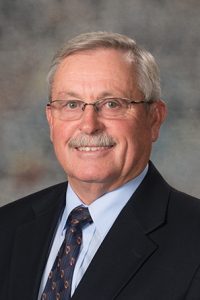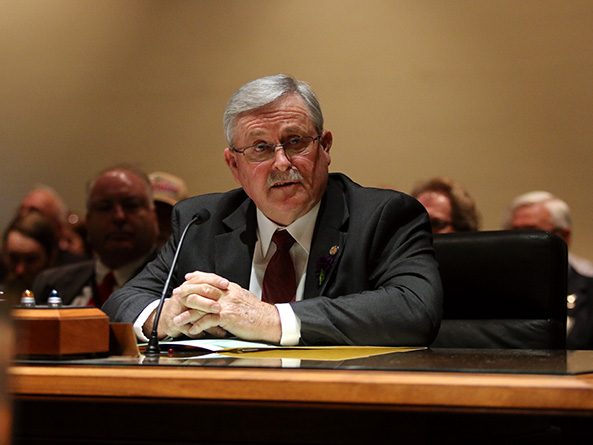Income tax credit requested on property taxes paid to schools
The Revenue Committee heard testimony Jan. 25 on a bill that would provide Nebraskans with income tax credits against the amount of property taxes they pay to schools.

Introduced by Bayard Sen. Steve Erdman, LB829 would provide a refundable state income tax credit equal to 50 percent of the property taxes paid to school districts during the taxable year beginning in 2019.
Providing for public education is one of the Legislature’s responsibilities outlined in the Nebraska Constitution, Erdman said, but the state currently is not paying its fair share. He said Nebraska relies too heavily on property taxes to fund its public schools at a time when property taxes are rising faster than incomes.
“The state cannot continue cutting funding for education knowing that property tax payers will have to pick up the slack,” Erdman said.
He said a petition drive is working to place a proposal similar to LB829 on the November 2018 general election ballot in case the Legislature fails to pass it.
The state Department of Revenue estimates that LB829 as introduced would reduce state tax revenue by approximately $263 million in fiscal year 2018-19 and a further $637 million in FY2019-20. That figure would rise to approximately $720 million in FY2024-25.
The department also provided an estimate of the bill’s impact if the Legislature were to eliminate the bill’s requirement that property taxes be paid in the same year that they are levied. In that case, the department estimates a loss of approximately $233 million in FY2018-19 and a further $800 million in FY2019-20. That would increase to $1.35 billion by FY2024-25.
Erdman said he has not suggested ways to pay for the proposal because that would be the Legislature’s job if either LB829 or the ballot initiative succeed.
“I don’t believe it’s my job to come here and explain to you or to share with people what I think the fix is,” he said. “My job is to describe to you that property tax is a problem, it’s out of line and we need to fix it.”
Doug Kagan of Omaha testified in support of the bill on behalf of Nebraska Taxpayers for Freedom. He said LB829 would provide tax relief for rural and urban property owners alike.
“Elderly citizens could comfortably remain in their homes,” Kagan said. “Rural landowners would not have to sell off land and inheritances to pay off the tax load.”
Kagan said the Legislature could offset the proposal’s cost by cutting the state budget, eliminating state agencies, repealing tax exemptions, privatizing government functions and decreasing the number of state employees.
Robert Johnston of Clearwater testified in support of the bill on behalf of the Nebraska Agricultural Leaders Working Group. Johnston said the group—comprising members of several agricultural organizations, including the Nebraska Cattlemen Association, the Nebraska Farm Bureau and the Nebraska Corn Growers Association—is looking for a proposal that would provide $600 million to $1 billion in property tax relief as soon as possible.
“Battling over property taxes for another year without results is unacceptable,” he said.
Jeff Metz, a farmer and rancher from Morrill County, also testified in support of the bill. He said property taxes in Nebraska are much too high and are especially burdensome on agricultural landowners. His property tax bill increased 600 percent in the last 10 years, he said.
Metz, who also serves as chairman of the Morrill County Board of Commissioners, said he would support an increase in the state sales tax to offset the credit proposed by LB829.
“We need to broaden the base of who’s paying for education,” he said. “Seventy-four percent of my property tax check goes to education—more people need to pay the bill.”
Jim Greisch, speaking on behalf of the Omaha and Lincoln chambers of commerce, testified in opposition to the bill. He said the chambers agree that property taxes, like all taxes in Nebraska, are too high. However, LB829 is the “worst possible answer” because it would not solve what he said is the root problem: excessive spending by local governments.
Greisch said the bill instead would lead to cuts to government services or a massive shift of the tax burden to state income and sales taxes.
“This is absolutely the wrong time to do this when our No. 1 priority should be growing our state,” he said.
Ann Hunter-Pirtle, executive director of Stand for Schools, also testified in opposition to LB829. She agreed with the bill’s supporters that Nebraska relies too heavily on property taxes to fund K-12 education and said the state should direct more aid to public schools.
“We understand the goal of this bill is to force a crisis and encourage the state to take action,” she said, “but blowing a billion-dollar hole in the state’s budget with no plan to pay for it is a dangerous game that would devastate not only public schools but many other state services as well.”
The committee took no immediate action on the bill.


